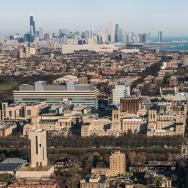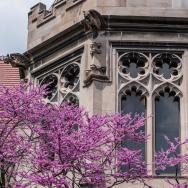University of Chicago historian Alice Goff has been named a recipient of the 2020 Berlin Prize from the American Academy in Berlin, awarded to scholars, writers, composers and artists from the United States who represent the highest standards of excellence in their fields.
She will begin a semester-long fellowship this fall at the Academy, which fosters intellectual, cultural, and political ties between Germany and the United States. A scholar of modern Germany, Goff will be working on her book manuscript, “The God Behind the Marble,” a history of the idea that a work of art can create a modern liberal society.
“I’m honored to receive a Berlin Prize fellowship, and especially to be part of a cohort of such exceptional writers and artists,” said Goff, an assistant professor in the Department of History. “In addition to providing the space and time to focus on my manuscript, the American Academy is giving me an invaluable opportunity to think in conversation about the implications of my historical work to contemporary cultural politics in Germany.”
Goff’s research and teaching center on the history of art and politics, museums, cultural preservation, and the history of the humanities in German states in the 19th and 20th centuries.
Her book project tracks the development of this idea in German political thought during the Revolutionary and Napoleonic wars, and in the upheaval of cultural property that accompanied these conflicts. By following the travails of art objects and their caretakers through looting, desecration and loss, Goff shows how a period of extraordinary hope for the power of art in theory was also one of great struggle with the vulnerability of art in practice.
Goff is one of 21 people selected for the 2020-21 class of Berlin Prize Fellows. The fellowship provides recipients with the time and resources to step back from their daily obligations to work on academic and artistic projects they might not otherwise pursue. Fellows are encouraged to work with local individuals and institutions in the Academy’s well-established network, forging rich connections and lasting transatlantic relationships.
—This story was originally published by the Division of the Social Sciences.

